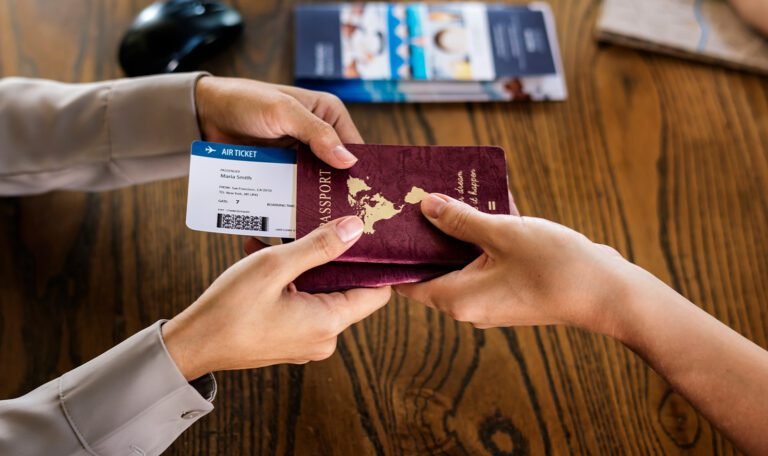Table of Contents
ToggleIn 2024, Indonesia rolled out the Digital Remote Worker Visa (E33G), which gives digital nomads the ability to legally live and work from Bali and soak up the island’s lifestyle. The new visa also gives remote workers more freedom to make a long-term home in Indonesia without breaking immigration laws. We outline the main visa options for remote workers and digital nomads in Bali below, which you should consider based on your life and work situation.
Digital Nomad Visa for Bali
Before making your travel plans for Bali, it’s crucial to grasp the visa application procedures. A variety of visa options are available in Bali. Upon landing, you can secure a 30-day Visa on Arrival for a short term stay. This Visa on Arrival is extendable up to 60 days.
- E33G Remote worker Visa
- D12 Multiple entry business Visa
- C2 Single entry Visa
For an extended visit up to six months, Digital nomads can look at the C2 Single entry visa for a visit up to 6 months, while people looking for a multiple entry solution will look at the D12 Multiple entry business visa.
For remote worker looking to have a KITAS and live in Indonesia the Digital Nomad Visa is the most suitable option.
Your visa process made easy with ILA
Indonesia has so many visas to choose from, each with its own requirements, regulations, and duration. With more constantly being issued by the government, it can be hard to keep track and choose one that is right for you.
With the help of ILA, you can be sure that you’ll get the best visa for your needs as quickly and efficiently as possible without having to worry about any missing documents.
Whether you’re looking for an Investor KITAS, Working KITAS, Second Home Visa, Spouse KITAS, Multiple Entry Business Visa or Remote Worker Visa, we can help make the process efficient and smooth.
Schedule a free consultation today or learn more about the different visa options.
Bali Digital Nomad Visa (Remote Worker Visa E33G)
Eligible remote workers are granted the chance to reside and work in Bali with recognized status by acquiring the E33G remote worker visa (KITAS for Bali Digital Nomad Visa), which allows for a 1-year Limited stay permit (KITAS).
Requirements for Bali Digital Nomad Visa
- Passport with a validity of 6 months minimum.
- Personal bank statement with a minimum amount of 2000 USD
- A recent picture of the applicant
- Bank account that proves income in the form of salary or income of 60 000 USD per year;
- Employment contract with a company established outside the Indonesian Territory
Activities you can do with a Bali Remote Worker Visa
- Carry out assignments from overseas companies.
- Bring eligible family to live in Indonesia.
- Travel to and from Indonesia.
- Conducting activities related to tourism, and visiting friends or family
How to apply for the remote worker visa
ILA can assist you in preparing the different paperwork and getting the authorization to work from Indonesia and Bali as a digital Nomad. The process takes 5 days to 2 weeks.
D2 Multiple Entry Business Visa (1 or 5 years)
People travelling in and out frequently to Indonesia without living here will probably look into the multiple entry business visa D2.
Requirements for D2 Multiple Entry Business Visa
- Passport with a validity of 6 months minimum.
- Personal bank statement with the minimum amount of 2000 USD or equivalent
- Recent picture of the applicant
- Letter from a sponsor (contact us for more information)
Activities allowed with the D2 Multiple entry business visa
- Carry out business, meetings, or purchase of goods including
- Discuss, negotiate, and/or sign business contracts.
- Activities related to tourism, and visiting friends or family
How to apply for the D2 Multiple entry business visa
ILA can assist you to apply to prepare the different paperwork and get the authorization to come to Indonesia and conduct business activities.
C2 – B211A Single Entry Business Visa (1, 2 or 5 years)
For digital nomad willing to stay in Bali 6 months and looking for a cheaper option can look a the single entry business visa.
Document Requirement
- Passport with a validity of 6 months minimum.
- Personal bank statement with a minimum amount of 2000 USD
- A recent picture of the applicant
- Invitation letter from Sponsor
Activities you can do with a B211A – C2
- You can carry out business, meetings, or purchase of goods including but not limited to checking goods at the office, factory, or production site of goods.
- You can negotiate, and/or sign business contracts.
- Conducting activities related to tourism, and visiting friends or family.
How to apply for the B211A – C2 Single entry business visa
ILA can assist you to apply to prepare the different paperwork and get the authorization to come to Indonesia and conduct business activities

Read also: Employment Contracts in Indonesia: A Comprehensive Overview
Frequently Asked Questions
Is Bali good for digital nomads?
Absolutely, Bali is an excellent choice for digital nomads due to its perfect combination of paradise living and connectivity.
Does Bali offer digital nomad visa?
Yes. Indonesia has a digital nomad visa called the E33G remote worker visa. Applicant can get a KITAS with this visa.
Where do most nomads live in Bali?
In Bali, nomads predominantly reside in the areas of Canggu and Ubud, where they are drawn to the serene ambience, an array of cultural experiences and a thriving tourism sector.
The cost of living in Bali can be quite affordable, with monthly expenses potentially being as low as $520.
Do you need a visa to work remotely in Bali?
Indeed, as a digital nomad, it is permissible to legally work remotely from Bali with a remote worker visa for a period of up to 1 year. You also have other option such as the business or tourist or multiple entry business visa.
Why is Bali a popular destination for digital nomads?
Bali has become a favored spot for digital nomads, attracting them with its cost-effective living, robust high-speed internet connectivity, dynamic expatriate community, breathtaking scenery, and diverse leisure options. This location provides an ideal blend for combining work remotely with pleasure.























